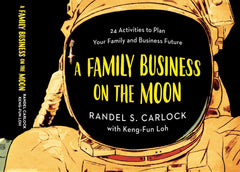Successful Family Firms Shoot for the Moon August 13, 2018
For family firms, plotting ambitious futures is like planning a space venture.
Bata Shoes is the largest shoe retailer on earth. Around since 1894, its current family members recently attended the INSEAD Family Enterprise Challenge. When they were completing an exercise exploring their family values and vision, one of the next-generation family members called out “why not a shoe store on the moon?”
His aspiration was logical. After all, where else should the world’s biggest shoe seller set its sights, but outer space? While audacious, it also stuck in our minds as a powerful metaphor of how successful family firms think about and plan for the future.
The more we explored it, the more we came to realise that long-term family business planning is the same as planning a trip into space. It demands effective communication, shared values and vision, sound planning, a significant investment of talent and money and accountability. No family could fly into space without a commitment to a shared purpose, the reason they are all in their space shuttle together.
But many families avoid the critical family planning process and therefore remain stuck on the launch pad. Even if they do launch, without an adequate plan for the family, the flight is troubled, misses its trajectory or altitude and in the worst cases, their space shuttle crashes. The most common reason for a crash is when families fail to plan for life after the founder's death. Siblings commonly squabble over control and either split the family businesses or drive them into the ground during lengthy battles for control.
Many business families believe that they should protect family harmony by avoiding difficult topics like succession, ownership or governance. The reality is just the opposite. We’ve seen many families with well-thought-out business plans and strategy end up in turmoil because the family side of family business has not been adequately planned for.

For this reason, we set about creating a fieldbook to help families shoot for the moon, together. “A Family Business on the Moon” is the culmination of our decades of research and working with family businesses. It is built on tried and tested frameworks for getting families aligned on their collective futures.
![]()
In our book, we detail how families can implement the Parallel Planning Process, an eight-step framework that gets families to answer crucial questions about their future.
A good family business will address questions head on, such as: Values: What is important to our family? Great business families have shared values that drive the family and management’s decisions.
Vision: What is a desirable future based on our values? When you commit to the vision as a family, you’ll come up with goals and strategies that are rational and achievable.
Strategy (Business and Family): How will we achieve our business and family visions? With a family involved in a business, things get more personal. It’s crucial that the business strategy includes the family strategy. For example, if your family’s vision is long-term business ownership then your family strategy should include qualified family members’ participation in business activities and active career planning for the next generation.
Investment (Human capital and financial capital): What human and financial resources will we contribute? Decisions about financial investment are a challenge for even the most capable and active families. Such decisions involve competing demands with various potential knock-on effects on the family’s wealth. Also, determining who will work in the business, who won’t and the sort of vehicles available to those who want to get off of the spaceship mid-flight will also be crucial decisions to account for.
Governance (Family and Business): How do we make decisions and ensure accountability? Family businesses need boards of directors even more than non-family businesses. The most professional family enterprises have independent directors from outside the family and the business. This ensures accountability and alignment of the family and business interests. Family governance is equally important to ensure this alignment. Regular family meetings or a family council can help to cement important decisions. Formal family agreement on policies around employment and careers can reduce conflict.

In our book, we give families material to plot these action steps, such as a set of values cards and fun activities at each step. But what really supports the Parallel Planning Process is when families agree to sit down together and commit to working out the answers to these questions which will eventually culminate in determining their shared purpose. This is the foundation for planning the business and family strategy, which can start with a SWOT competitive analysis for the business and a commitment assessment for the family. Ultimately, none of these steps takes place without communication based on respect, listening, ensuring nobody is left behind (even though it’s possible that not everyone will want to be involved right away), matching skills to roles and agreeing on how to invest the family’s financial capital and, more importantly, its human capital.
Neither can any of these steps be accomplished in an hour-long meeting. They should be considered at length and not in isolation. Creating a flight plan for a trip to the moon is not easy and neither should it be. The space flight analogy also applies critically to the next generation. We’ve talked about ideas such as planning for the trip and launching into space because family entrepreneurs are trailblazers, going places nobody has been before. This is just as relevant to the next generation as it was for the founders of family enterprises. Successful family firms are those that prepare each generation to embark on its own entrepreneurial journey to sustain their family’s legacy.
A successful global company based on values
Demonstrating why agreement on family values and strategy is crucial to catapulting a family business to the stars, consider the story of MAS Holdings, a multi-billion dollar apparel manufacturing company from Sri Lanka.
It was started by three brothers; Mahesh, Sharad and Ajay during the Sri Lankan civil war. They wanted to challenge the typical “sweatshop” model of many clothing manufacturers. They made empowering their employees, 85 percent of whom are women, their purpose.
Their chosen values are “humility, trust and mutual respect”. Their thinking was that employees with opportunities to train for good jobs with better pay and respect would lead to a happy workforce with high productivity. They were right. The company now has 94,000 employees and supplies some of the biggest fashion brands, such as Nike, Victoria’s Secret, Lululemon and Marks & Spencer.
Ajay affectionately told the story of Kumari, a seamstress he hired. She had never seen a sewing machine before she worked at MAS. But before long, she’d been promoted to a team leader and then again to a supervisor. She attended the company’s IT and English courses and was later sent to work in New Jersey at the company’s new product development and design centre. She’d never left her home town before.
MAS’s purpose-driven business model has helped it thrive and the company continues to make decisions to help the less fortunate. When customers wanted the firm to build additional capacity, it chose to put plants in the north of Sri Lanka (the territory formerly controlled by the Tamil Tiger rebels) in what Ajay calls “both an ethical and financial decision.”
Randel Carlock is the Berghmans Lhoist Chaired Professor in Entrepreneurial Leadership at INSEAD. He was the first academic director of the Wendel Centre for Family Enterprise and is the director of The Family Enterprise Challenge, an Executive Education programme for family business leaders. He is also the author of several other books on family business.
Keng-Fun Loh is the Managing Partner of Family and Business Learning. She holds the Family Firm Institute (FFI) Certificate in Family Business Advising. "A Family Business on the Moon" is her first book.
Visit INSEAD Knowledge Copyright © INSEAD 2018. All rights reserved.
This article first appeared on INSEAD Knowledge (http://knowledge.insead.edu).
